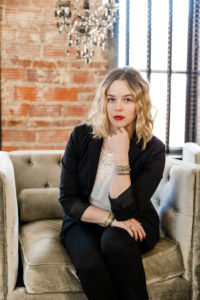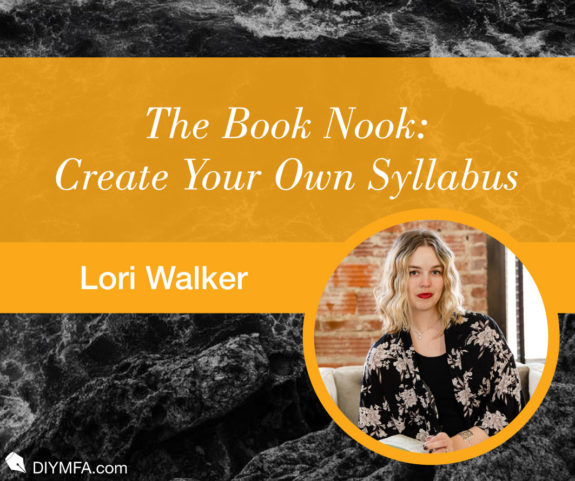Something about the back-to-school season gets me thinking about big projects for myself. And, like many word nerds, the way I prep for a big project is to read about it. I’ve found it useful to create a syllabus, a list of required reading, for my writing project to keep me on track and to help me be prepared.
Ultimately, this syllabus is a mix of craft books to get you prepared and a list of comp books to keep you on track. But, of course, at some point, we have to stop reading and start actually doing the big project, so there are a few things you need to consider when you start putting together your own syllabus. As well as a few suggestions for picking the right books.
Things to Consider Before Making Your Syllabus
I know, it’s exciting. A reading list you are actually looking forward to conquering! But you don’t want to go in and start adding a bunch of books all willy-nilly because you want to keep the syllabus focused so that at some point you actually do start writing.
First things first, gather your materials. For writers, these are pretty standard: pen and paper, laptop, notes app on your phone, whatever you use to record ideas. You’ll also want your bookshelves handy, whether they are physical bookshelves, on an eReader, or in some fancy spreadsheet you have that lists all of your books. I say this because you probably already have the books you need for this syllabus on your shelves and don’t actually need to spend more money on this project.
Now you need to do some thinking so that you can be sure to choose the right books and the right number of books for your syllabus. So pour yourself a drink, grab your idea recording implements, and ponder the following:
- Think about the scope of your project: What are you wanting to do?
- Consider your timeline: How long are you giving yourself for the different phases of the project?
- Consider your existing knowledge: How much do you already know about writing in this genre AND how widely have you already read in this genre?
For instance, I am planning to really devote myself to writing personal essays. I want to develop a regular writing routine and amass a pretty big arsenal of completed drafts so that every so often I can go on a polishing and submitting spree.
I’m giving myself two weeks to review a couple of craft books I’ve already read on memoir writing before I want to start that regular writing routine. I plan to hit the writing hard for a solid month before I start polishing and submitting anything.
I am already pretty knowledgeable about memoir and essay writing, but I need to gather and refine this knowledge, which is why I am reviewing craft books I’ve already read. While I am doing the writing, I am going to be reading within the genre. Not exclusively, because I do enjoy novels and I have books to read for work, but I am going to amp it up a bit.
Now we can start making the syllabus.
Your Textbooks
This section consists of your craft books. Craft books are useful for your syllabus because someone who has already done the thing is walking you through what worked for them. You can learn from their mistakes and you can learn what worked for them. Many often have jumping-off points to get you writing by way of exercises, prompts, or journaling activities. As you work your way through the craft books, mark these down somehow; they’ll be useful when you get to writing and inevitably feel stuck.
Chances are you’ve already got a couple of craft books focused on the genre you’re wanting to write in and you’ve also probably already read them. I’ve identified three books on the type of writing I’m wanting to do that I’ve already read, which is great because I can more quickly flip back through them, jot down some notes, and compare what the different writers have said.
If you haven’t already read a couple of craft books in your specific chosen genre, I’d recommend picking one or two and give yourself time to go through them. Just be sure to give yourself a deadline to finish them.
Whether you’ve read the craft books before or not, deadlines are important here because you really do need to get writing. Like I’ve said, craft books can be useful, but they don’t get words on the page. A lot of times we use craft books as a method of procrastination.
I want to pause here to highlight a fourth book I am putting in this category—Ordinary Genius: A Guide for the Poet Within by Kim Addonizio. Yes, she talks a lot about poetry because that’s her genre, but the prompts and advice she gives could be translated for any genre. Plus, I think a little poetry practice could only benefit my nonfiction writing. Just think about it.
Your Supplemental Reading
These are the books within your genre. Again, I’m betting you’ve already read a bunch of these and own a bunch more, because I think most people decide to write in a genre they like to read. This is good because you’re already familiar with the genre and how it works and it’ll help save your bank account a bit.
Look at your shelves and start listing authors within your genre, whether you’ve read them before or not. This will probably be a pretty long list. I didn’t look at my shelves and came up with a list of 28 contemporary memoir and essay writers off the top of my head, many of whom have published multiple books that I own.
Don’t worry. You’re not going to have to read all of the books by all of these authors. The list I made would easily include well over 50 titles by these 28 authors (I’m way low-balling it). I might read 50 books in a good year, but I’m not wanting to forgo reading novels for an entire year. We’re going to cut the list in a minute.
Be sure to write down the authors of your textbooks and read. It’ll give you a chance to see their advice in action.
Now we start winnowing down the list. We’re looking for maybe 8-10 books that you can keep close to your writing space to inspire and excite you. Books that you can pick up when you’re not sure what to read next. Books that you can flip through to remind you why you’re doing what you’re doing, to show you what you’re doing in action.
Look through the list of authors you’ve amassed and start thinking about your specific project. Which ones capture some element of your project?
For instance, my writing tends to skew more humorous than Joan Didion, so while I love her, she wouldn’t be on my shortlist. On the other hand, Nora Ephon is known for infusing humor into her writing. Her earlier collections are previously published journalism pieces, so those wouldn’t make the cut, BUT her last two collections are more solidly in the personal essay column.
Think broadly here. I included a couple of full-length memoirs, even though I am writing essays because the writing style fits. I added a memoir told in vignettes because that’s something I’d like to experiment with. Another essay collection doesn’t match my tone, but explores themes I’m wanting to write about. And so on.
Again, the point here is to inspire you, to challenge you, and to show you writing techniques you want to try in action.
Also, this shortlist of supplemental reading isn’t set in stone. If you suddenly get the urge to read a book by an author from your long list, go for it! See where it takes you. The shortlist is really to give you some titles to grab without having to think too hard so that you can be reading in your genre while you work on your project.
I want to pause here to highlight another great source to consider: the Best American series. This is a yearly edition of the “best” twenty-ish short pieces in a variety of genres—essays, short stories, mystery and suspense, science fiction. There are a few series they’re no longer publishing (like sports writing and travel writing), but the old volumes are probably pretty easily findable. I love this series because every year they have a different guest judge who is a big name in that field and they write an essay that’s a nice little masterclass. Another thing to think about.
Now that you’ve got your syllabus put together, it’s time to get cracking.
Happy reading and writing!

Lori Walker is the Operations Maven at DIY MFA. Though she’s fallen off the wagon as a writer, she’s hoping to return to writing essays (perhaps even a novel!) through her involvement with DIY MFA. She is also Launch Manager, Web Editor, and Podcast Producer for DIY MFA and a Book Coach. She resides in Smalltown, Oklahoma, with her husband and their cat, Joan Didion. You can follow her on Instagram at @LoriTheWriter.







